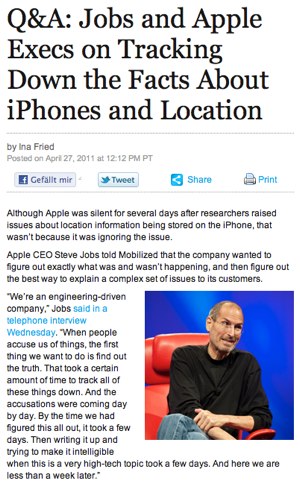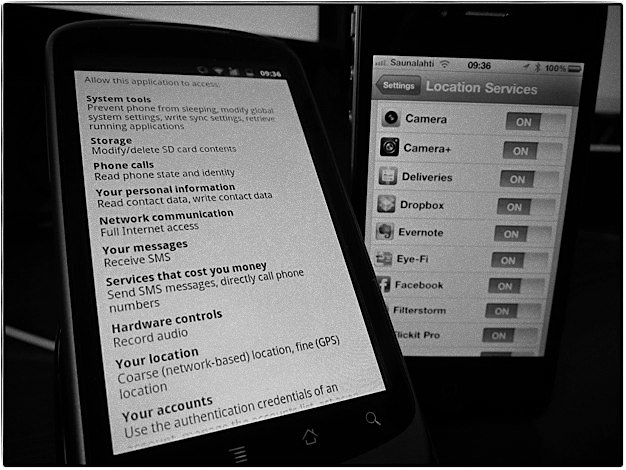Interview-Mitschrift: Jobs, Schiller und Forstall erklären sich zur Erhebung der Positionsdaten

Ina Fried führte für AllThingsD ein Telefoninterview mit Steve Jobs, Scott Forstall und Phil Schiller zur Positionsdatenerhebung von iOS-Geräten. Zuvor äußerte sich Apple per Pressemitteilung erstmals zu den Vorwürfen, der IT-Konzern würde Bewegungsprofile seiner Nutzer erstellen, die als These von zwei O’Reilly-Forschern in den Raum gestellt wurde.
Mittlerweile findet sich auf Mobilized.AllThingsD.com die Transkription des Gesprächs. Hier ein paar Highlights.
Steve Jobs:
As new technology comes into the society there is a period of adjustment and education. We haven’t, as an industry, done a very good job educating people, I think, as to some of the more subtle things going on here. As such, (people) jumped to a lot of wrong conclusions in the last week.
Versteckt hochnäsig, aber sicherlich eine treffende Analyse.
I think Apple will be testifying. They have asked us to come and we will honor their request, of course. I think it is great that they are investigating this and I think it will be interesting to see how agressive or lazy the press is on this in terms of investigating the rest of the participants in the industry and finding out what they do.
Jetzt offensichtlich überheblich, aber mit erneut präziser Zustands-Beschreibung.
Phil Schiller:
I would think an analogy of a crowdsourced database is every time you walk into a retail store, many retailers have a clicker that counts how many people come in and out of the store. Nobody really cares about that because it is completely anonymous. […] Things like that aren’t so scary when you think about them in everyday terms.
In einigen Fällen sicherlich richtig, in ganz vielen anderen Angelegenheiten jedoch auch nicht. Die Datensammelwut von Unternehmen ist ein Problem. Missbrauch ist an der Tagesordnung. Firmen sind daher in Zugzwang offenzulegen, was wofür erhoben wird. Apple hat in der vergangenen Woche darin keinen guten Job gemacht.
Scott Forstall:
As you say, whenever any user wants any application to access their location, the user has to approve that on a per-application basis. […] They can actually go and turn it off temporarily for an app, if they like. In addition, any application which has used location within the last 24 hours is shown, with an indicator in settings. So a user can know which applications that a user has approved for location have actually used location recently. We think this is incredibly fine grain and the best out there.
Apple siedelt sich definitiv am oberen Ende einer imaginären Skala an, Positions-Abfragen transparent für den Nutzer darzustellen. In diesem Fall soll jedoch der ‚Bug‚ nicht in Vergessenheit geraten, der genau dies versaubeutelte.

Steve Jobs:
That took a certain amount of time to track all of these things down. And the accusations were coming day by day. By the time we had figured this all out, it took a few days. Then writing it up and trying to make it intelligible when this is a very high-tech topic took a few days. And here we are less than a week later.
Ein Schelm, wer böses dabei denkt. Das Thema nahm soviel Raum ein, dass sich jedes andere Produkt jeglichen Ansatz einer Ankündigung verkniff, wenn man nicht hoffnungslos unbeachtet bleiben wollte. Außer, ja außer natürlich das weiße iPhone 4. Das die Pressemitteilung im Dreiergespann zu identischer Minute auf Apple.com/PR aufschlug, besaß zumindest einen faden ‚Lasst-uns-bitte-weiterarbeiten‚-Beigeschmack.
Kleiner Zusatz: Im Rahmen des Interviews – das Apple trotz PR-Meldung anscheinend doch für notwendig hielt – riss Steve Jobs die Probleme mit der weißen iPhone-Produktion kurz an:
It’s not as simple as making something white. There’s a lot more that goes into both the material science of it–how it holds up over time…but also in how it all works with the sensors.
Detaillierter werden wir’s wohl vorerst nicht bekommen.